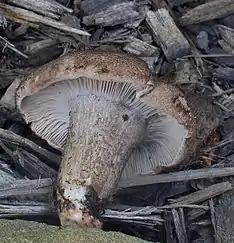Pseudotricholoma umbrosum
Pseudotricholoma umbrosum, commonly known as the amyloid tricholoma,[1] is a species of fungus in the family Tricholomataceae, and the type species of the genus Pseudotricholoma. It was first described scientifically by mycologists Alexander H. Smith and Maurice B. Walters in 1943 as a species of Tricholoma.[2] Rolf Singer transferred it to Porpoloma (subgenus Pseudotricholoma) in 1962.[3] The mushroom is found in North America, where it fruits singly or in small groups under conifer trees. Although it resembles a Tricholoma species, it is distinguished from that genus by its amyloid spores.[1]
| Pseudotricholoma umbrosum | |
|---|---|
 | |
| Scientific classification | |
| Kingdom: | |
| Division: | |
| Class: | |
| Order: | |
| Family: | |
| Genus: | |
| Species: | P. umbrosum |
| Binomial name | |
| Pseudotricholoma umbrosum (A.H.Sm. & M.B.Walters) Sánchez-García & Matheny (2014) | |
| Synonyms | |
| |
References
- Bessette A. (1997). Mushrooms of Northeastern North America. Syracuse University Press. p. 236. ISBN 978-0-8156-0388-7.
- Smith AH, Walters MB. (1943). "A new species of Tricholoma". Mycologia. 35 (4): 477–9. doi:10.2307/3754600. JSTOR 3754600.
- Singer R. (1961). "Diagnoses fungorum novorum Agaricalium II". Sydowia. 15 (1–6): 45–83 (see p. 53).
This article is issued from Wikipedia. The text is licensed under Creative Commons - Attribution - Sharealike. Additional terms may apply for the media files.